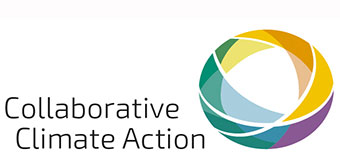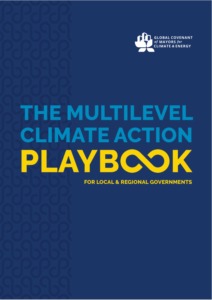GCoM Releases Guide to Empowering Local and Regional Climate Contributions
Multilevel Climate Action Playbook for Local and Regional Governments
The Multilevel Climate Action Playbook for Local and Regional Governments is a toolkit published during COP26 by the Global Covenant of Mayors (GCoM) with support from the European Commission, ICLEI, Climate Alliance, CDP, UN-Habitat, CUSP, UCLG, the EU Committee of the Regions, the JRC, UNDP, UNFCCC, WRI FCM and GIZ. With the aim of integrating regional and local contributions (RLCs) into Nationally Determined Contributions (NDCs), the playbook is targeted to subnational and national governments and GCoM alliance partners and practitioners.
On publication, GCoM wrote that “effective multilevel governance and coordination[,] collaboration, communication, and engagement among all levels of government” are critical “to achieving the credible, just, and ambitious commitments required to avoid a climate catastrophe.” The Multilevel Climate Action Playbook for Local and Regional Governments covers five goals: to understand existing barriers to multilevel climate collaboration, identify mechanisms for integrating RLCs into policy developments, recommend enabling activities to advance multilevel climate coordination, highlight “assists” from GCoM partners, parties and the private sector that support NDC policy and RLCs, and share resources to the wider community engaged in multilevel climate action.
Regional and local contributions are defined as: “The climate commitments, actions, and achievements of local and regional governments – across mitigation, adaptation, and energy access and poverty – whose value in bolstering Nationally Determined Contributions is formally acknowledged by the UNFCCC and its Parties. RLCs are designed to be integrated into the development of each Party’s NDC in a process of complementarity with existing commitments, with the potential to strengthen their ambition and robustness.”
GCoM estimates that cities and local governments could comprise 3.8 GtCO2e – or the equivalent of four years of Co2 emissions from global commercial aviation – of annual emissions abatement potential by 2030. Using existing and proven technologies, greenhouse gas emissions from urban areas could be reduced by 90% by 2050. Ambitious numbers like this, however, can only be achieved with significant local and regional action. The Playbook suggests a bidirectional path to strengthening climate action, where national governments can ensure the empowerment of local and regional action by bolstering them in the NDC process, and RLCs can enhance and strengthen the ambition of NDCs. The Playbook puts forth a two-pronged approach, recommending:
- The inclusion of Regional and Local Governments and integration of their contributions in their country’s NDC strategic planning and technical working groups.
- Comprehensive, annual, and UNFCCC-aligned impact reporting facilitated by GCoM. GCoM has data from over 11,000 cities and local governments that can scale up reporting, evaluation, action and support.
A comprehensive report that acknowledges local differences and various systemic assets and barriers that help and hinder different states in their NDC and RLC development, the Multilevel Climate Action Playbook for Local and Regional Governments is a collaborative effort and next step towards making climate action contextually and vertically inclusive and integrated.
Find out how the Playbook proposes successful RLC integration into NDC development by clicking on “Read online”.


